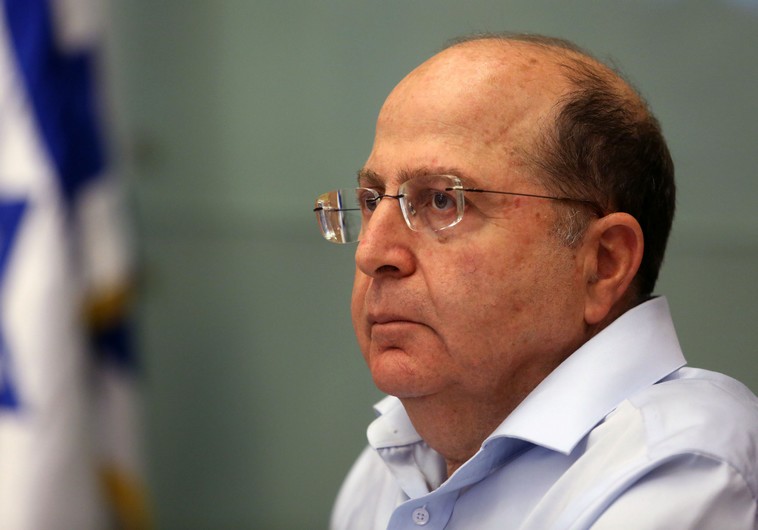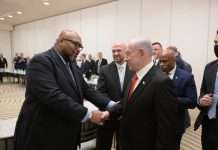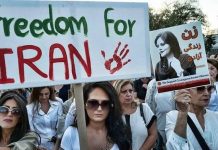Ya’alon: We see Iranian influence in Gaza
By YAAKOV LAPPIN/02/24/2015
Israel is seeing Iranian influence in the Gaza Strip, Defense Minister Moshe Ya’alon said on Tuesday during a tour of the IDF Southern Command with Prime Minister Benjamin Netanyahu. “Iran’s arms are actually sent to every possible place in the Middle East,” Ya’alon said. “The support for Palestinian Islamic Jihad, the support for Hamas – we see the arms beyond the borders of the [Southern] Command, too, [but also] in Lebanon with Hezbollah, on the Golan Heights, in the front they are trying to open against us, and as they declare, they wish to set up a terrorism infrastructure in Judea and Samaria.”
The defense minister added that in Sinai, Egyptian security forces were acting against extremist Islamic elements that have attacked Israel in the past and might try to do so again. His comments came before Maj.-Gen. Sami Turgeman, head of the Southern Command, cited a number of soldiers for exemplary actions during Operation Protective Edge last summer. Members of the Artillery Corps’s Dragon Battalion and Sky Rider tactical drone unit received letters of commendation from Turgeman signed by newly instated IDF Chief of Staff Lt.-Gen. Gadi Eizenkot.
The Dragon Battalion, together with the Namer (Leopard) Battalion, provided critical fire support to infantry and armored units during the fighting, firing thousands of shells and destroying enemy targets. Their actions helped rescue units that came under heavy Hamas fire and enabled maneuvering units to complete their missions.
The Sky Rider drone unit deployed throughout the Gaza sector, providing continuous assistance to ground units. The drone operators identified large numbers of enemy targets and thwarted numerous attempts to attack IDF units, saving the lives of soldiers. Conscripted and reserve Sky Rider unit members continued to operate in the area after hostilities ended.
White House denies 10-year agreement with Iran
By HERB KEINON, REUTERS/02/24/2015
Reports that the United States was negotiating a 10-year nuclear deal with Iran are not true, White House spokesman Josh Earnest said on Tuesday. The Wall Street Journal reported that the United States and Iran were exploring the option of a 10-year nuclear freeze as part of talks over Tehran’s nuclear program. AP reported the deal would initially freeze Iran’s nuclear program but gradually allow it to increase activities that could enable it to produce nuclear arms in the last years of the agreement, which is expected to last some 10 years. The Jerusalem Post reported in November that Israeli officials were very concerned about the agreement’s definitive end date – or “sunset clause” – saying that, after the agreement’s expiration date, when Iran’s nuclear infrastructure will not have been dismantled, it will essentially be free to do whatever it wants.
Not only will the infrastructure not be dismantled, but, according to AP, the idea on the table now is to reward Iran during the duration of the agreement for good behavior by gradually lifting the limitations on its uranium enrichment. Negotiators hope to meet a self-imposed March 31 deadline for an initial political deal, but a senior US official said that would not “make us rush to an agreement that does not fulfill the objectives that the president has given to us.” The aim of ensuring that Iran does not acquire a nuclear weapon “has to be met, and that is not about the deadline, it is about the purpose,” the official said.
Diplomats say the six major powers aim for a deal lasting at least 10 years, under which Iran would need at least one year to produce enough highly enriched uranium for a single nuclear bomb – the so-called breakout capacity. “We have always said we will have a one-year breakout time for a double- digit number of years, and that remains the case,” the senior US official said on Monday. Israel’s position, and a source of friction between Jerusalem and Washington, is that a year is not enough time.
Reflecting the technical nature of the latest talks, US Energy Secretary Ernest Moniz and Iranian atomic nuclear chief Ali Akbar Salehi took part. Helga Schmid, political director of the European Union’s External Action Service, also attended. As the details of the emerging deals were coming out, Defense Minister Moshe Ya’alon reiterated Israel’s staunch opposition. “The agreement with Iran as it is coming together now is a great danger to Western world peace and a threat to Israel’s security,” he said.
“Iran today is the leading factor for instability in the Middle East, and it sends terrorist proxies around the world with the goal of harming Western and Israeli interests,” he said. “Therefore, any agreement that will be signed between the West and this apocalyptic, messianic regime will severely harm Western and Israeli interests and enable Iran to become a threshold nuclear state and continue its terrorist activities.”





















